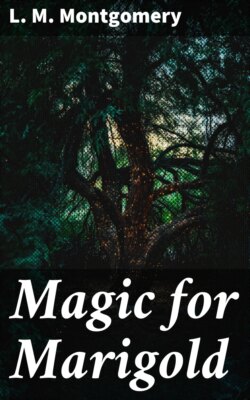Читать книгу Magic for Marigold - L. M. Montgomery - Страница 12
На сайте Литреса книга снята с продажи.
3
ОглавлениеTable of Contents
Lucifer was prowling about the bed of striped ribbon-grass, giving occasional mysterious pounces into it. The Witch of Endor was making some dark magic of her own on the white gate-post. They were both older than Marigold, who felt therefore that they were uncannily aged. Lazarre had confided to her his belief that they would live as long as the Old Lady did. “Dey tells her everyt’ing—everyt’ing,” Lazarre had said. “Haven’ I seen dem, sittin’ dare on her bed, wi’ deir tail hangin’ down, a-talkin’ to her lak dey was Chreestian? An’ every tam dat Weetch she catch a mouse, don’t she go for carry it to de Old Lady to see? You take care what you do ’fore dose cats. I wouldn’t lak to be de chap dat would hurt one of dem. What dem fellers don’ know ain’t wort’ knowin’.” Marigold loved them but held them in awe. Their unfailing progeny gave her more delight. Little furry creatures were always lying asleep on the sunwarm grasses or frisking in yard and orchard. Ebon balls of fluff. Though not all ebon, alas. The number of spotted and striped kittens around led Uncle Klon to have his serious doubts about the Witch’s morals. But he had the decency to keep his doubts to himself, and Marigold liked the striped kittens best—undisturbed by any thought of bends sinister. Creatures with such sweet little faces could have no dealings with the devil she felt quite sure, whatever their parents might be up to.
Lazarre had given over fiddling and was going home—his little cottage down in “the hollow,” where he had a black-eyed wife and half a dozen black-eyed children. Marigold watched him crossing the field, carrying something tied up in a red hanky, whistling gaily, as he was always doing when not fiddling, his head and shoulders stooped because he was continually in such a hurry that they were always several inches in advance of his feet. Marigold was very fond of Lazarre, who had been chore-man at Cloud of Spruce before she was born and so was part of the things that always had been and always would be. She liked the quick, cordial twinkle in his black eyes and the gleam of his white teeth in his brown face. He was very different from Phidime Gautier, the big blacksmith in the Hollow, of whom Marigold went in positive dread, with his fierce black moustaches you could hang your hat on. There was an unproved legend that he ate a baby every other day. But Lazarre wasn’t like that. He was kind and gentle and gay.
She was sure Lazarre couldn’t hurt anything. To be sure there was that horrible tale of his killing pigs. But Marigold never believed it. She knew Lazarre couldn’t kill pigs—at least, not pigs he was acquainted with.
He could carve wonderful baskets out of plum-stones and make fairy horns out of birch-bark, and he always knew the right time of the moon to do anything. She loved to talk with him, though if Mother and the Grandmothers had known what they talked about sometimes they would have put a sharp and sudden stop to it. For Lazarre, who firmly believed in fairies and witches and “ghostises” of all kinds, lived therefore in a world of romance, and made Marigold’s flesh creep deliciously with his yarns. She didn’t believe them all, but you had to believe what had happened to Lazarre himself. He had seen his grandmother in the middle of the night standing by his bed when she was forty miles away. And next day word had come that the old lady had “gone daid.”
That night Marigold had cried out in terror, when Mother was taking the lamp out of her room, “Oh, Mother, don’t let the dark in—don’t let the dark in. Oh, Mother, I’m so afraid of the big dark.”
She had never been afraid to go to sleep in the dark before, and Mother and Young Grandmother could not understand what had got into her. Finally they compromised by leaving the light in Mother’s room with the door open. You had to go through Mother’s room to get to Marigold’s. The dusky, golden half-light was a comfort. If people came and stood by your bed in the middle of the night—people who were forty miles away—you could at least see them.
Sometimes Lazarre played his fiddle in the orchard on moonlight nights and Marigold danced to it. Nobody could play the fiddle like Lazarre. Even Salome grudgingly admitted that.
“It’s angelic, ma’am, that’s what it is,” she said with solemn reluctance as she listened to the bewitching lilts of the unseen musician up in the orchard. “And to think that easy-going French boy can make it. My good, hard-working brother tried all his life to learn to play the fiddle and never could. And this Lazarre can do it without trying. Why he can almost make me dance.”
“That would be a miracle indeed,” said Uncle Klon.
And Young Grandmother did tell Marigold she spent too much time with Lazarre.
“But I like him so much, and I want to see as much of him as I can in this world,” explained Marigold. “Salome says he can’t go to heaven because he’s a Frenchman.”
“Salome is very wicked and foolish to say such a thing,” said Young Grandmother sternly. “Of course, Frenchmen go to heaven if they behave themselves”—not as if she were any too sure of it herself, however.
